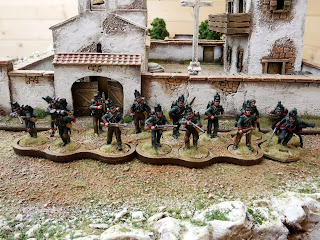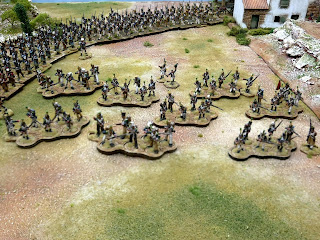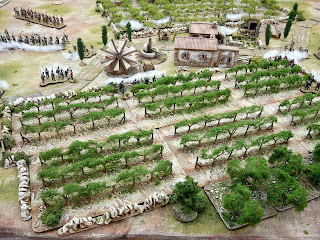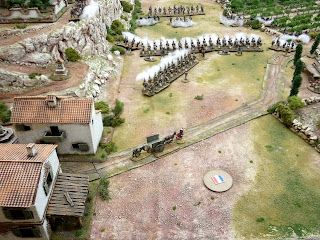Since my last post, I have been busy painting up enough figures to add to my existing collection for a four-player Sharp Practice Peninsula game that I put on last Friday (more of which later in this post).
You forget how much longer it takes to paint Napoleonic's when you have been painting WW2 for a while but I still managed to paint 149 figures plus a wagon, horses, mules, donkeys, goats, and some geese all to a reasonable standard as you can see from the pictures, over about a five-week period. I will cover this in the Mediterranean book on how to cut corners and still achieve a reasonable standard to speed up your paint time.
First up are some Spanish Militia.
Spanish Cazadores.
Spanish Guerrilla's.
5th Battn, 60th (Royal American)
A wagon and some animals.
French Officers and NCO's.
Grenadiers. 3 x groups 8
Centre Company. 3 x groups 8
Another Centre Company. 2 x groups 8
All together.
With French from my existing collection.
I already had two six-man groups of Voltigeurs and I have now added another six to give me eight six-man groups plus command.
This is starting to get picture heavy and I should put the Sharp Practice stuff on a later post but have decided to put it all on this one, so apologies if you find it all a bit too much in one go.
SHARP PRACTICE.
The table layout before the game. As you can see the center of the table has a small farm with a vineyard and olive grove dividing the table in two. As it was going to be a four player game this was done to keep the action separate as much as possible but a player could assist his colleague if need be but it would take time for him to cross the terrain.
Olive Groves.
I treated olive groves the same as orchards in the rule book with visibility 6" from the edge for firing in and out of, and 18" visibility if both the firing unit and the target are within the grove. Movement through the groves is classed as Broken Ground in the rule book.
Vineyards
Vineyards are a totally different kettle of fish than mature olive groves and orchards in their layout and how it affects visibility, cover, and movement. (A young olive grove set out in rows would have fewer restrictions in movement and visibility).
Understandably, there didn't seem to be anything in the rules that cover this unique type of terrain so I put down a few guidelines for the players to use in our game.
With vineyards, if you are traveling along the rows or grain if you like, then there is no restriction in movement and at the same time no cover from view from a unit facing directly along this channel. On the other hand, if you are going against the grain trying to clamber through or over the vines, then movement become a lot more difficult and visibility would reduce with each additional row of vines.
I went with the following:
AGAINST THE GRAIN - Two rows of vines for visibility when firing in or out from a vineyard and three rows for visibility when both the firer and target are within the vineyard.
Movement against the grain I treated as a small obstacle for each row rolling and discarding the lowest dice.
WITH THE GRAIN - Classed as in the open with no restrictions in movement or cover/visibility.
WITH THE GRAIN.
AGAINST THE GRAIN.
THE GAME.
Each player had just over 100pts and eight leaders each.
French Player One.
Three Groups of 8 Line Infantry.
Two Groups of 8 Line Infantry.
Three Groups of 8 Grenadiers.
Four Groups of 6 Voltigeur Skirmishers.
French Player Two - same as player one but with Three Groups of 8 Voltigeur Line instead of the Grenadiers.
British Player One.
Three Groups of 8 Regulars
Two Groups of 6 Light Company Skirmishers.
Two Groups of 6 95th Rifles.
One Group of 10 Spanish Militia.
One Group of 6 Spanish Guerrilla Skirmishers.
British Player Two.
As player one but Two Groups of 6 5th/60th Rifles instead of the 95th and One Group of 6 Spanish Cazadores Light Infantry instead of the Militia and Guerrillas.
Unfortunately, I was to busy playing to take any pictures of the game at the time but I have restaged the event with pictures at the highwater mark, minus the shock markers and masses of casualties.
The French voltigeurs managed to keep the better quality and more numerous British/Spanish skirmish troops in check whilst the French Line combined Five Groups into one formation and executed a crashing volley on the British Line which was a battle winner for the French.
Sharp Practice is a great set of rules and I had a fun time even being on the receiving end of the French crashing volley. The pictures give a rough idea of deployment but some of the skirmish screens had fallen back from their original positions due to shock and casualties.
An overview from both ends of the table.
British Left, Centre and Right Flank.
French Left, Centre and Right Flank.
Different views of the table.
Spanish Militia took a long flank march and eventually arrived on top of the ridge looking down on the French flank where they poured in fire causing double the amount of shock on the French but they were then driven back from a first fire volley by a French formation in reserve.
The French centre and Right Flank.
Spoils of war.
If you are new to this blog and you are interested in the first book, Setting The Scene - Winter Wargaming, then we now have extra copies in stock so just go to the top right side of this page (second box down) and click on 'Setting The Scene' if you want to buy a copy.
You forget how much longer it takes to paint Napoleonic's when you have been painting WW2 for a while but I still managed to paint 149 figures plus a wagon, horses, mules, donkeys, goats, and some geese all to a reasonable standard as you can see from the pictures, over about a five-week period. I will cover this in the Mediterranean book on how to cut corners and still achieve a reasonable standard to speed up your paint time.
First up are some Spanish Militia.
Spanish Cazadores.
Spanish Guerrilla's.
5th Battn, 60th (Royal American)
A wagon and some animals.
French Officers and NCO's.
Grenadiers. 3 x groups 8
Centre Company. 3 x groups 8
Another Centre Company. 2 x groups 8
All together.
With French from my existing collection.
I already had two six-man groups of Voltigeurs and I have now added another six to give me eight six-man groups plus command.
This is starting to get picture heavy and I should put the Sharp Practice stuff on a later post but have decided to put it all on this one, so apologies if you find it all a bit too much in one go.
SHARP PRACTICE.
The table layout before the game. As you can see the center of the table has a small farm with a vineyard and olive grove dividing the table in two. As it was going to be a four player game this was done to keep the action separate as much as possible but a player could assist his colleague if need be but it would take time for him to cross the terrain.
Olive Groves.
I treated olive groves the same as orchards in the rule book with visibility 6" from the edge for firing in and out of, and 18" visibility if both the firing unit and the target are within the grove. Movement through the groves is classed as Broken Ground in the rule book.
Vineyards
Vineyards are a totally different kettle of fish than mature olive groves and orchards in their layout and how it affects visibility, cover, and movement. (A young olive grove set out in rows would have fewer restrictions in movement and visibility).
Understandably, there didn't seem to be anything in the rules that cover this unique type of terrain so I put down a few guidelines for the players to use in our game.
With vineyards, if you are traveling along the rows or grain if you like, then there is no restriction in movement and at the same time no cover from view from a unit facing directly along this channel. On the other hand, if you are going against the grain trying to clamber through or over the vines, then movement become a lot more difficult and visibility would reduce with each additional row of vines.
I went with the following:
AGAINST THE GRAIN - Two rows of vines for visibility when firing in or out from a vineyard and three rows for visibility when both the firer and target are within the vineyard.
Movement against the grain I treated as a small obstacle for each row rolling and discarding the lowest dice.
WITH THE GRAIN - Classed as in the open with no restrictions in movement or cover/visibility.
WITH THE GRAIN.
AGAINST THE GRAIN.
THE GAME.
Each player had just over 100pts and eight leaders each.
French Player One.
Three Groups of 8 Line Infantry.
Two Groups of 8 Line Infantry.
Three Groups of 8 Grenadiers.
Four Groups of 6 Voltigeur Skirmishers.
French Player Two - same as player one but with Three Groups of 8 Voltigeur Line instead of the Grenadiers.
British Player One.
Three Groups of 8 Regulars
Two Groups of 6 Light Company Skirmishers.
Two Groups of 6 95th Rifles.
One Group of 10 Spanish Militia.
One Group of 6 Spanish Guerrilla Skirmishers.
British Player Two.
As player one but Two Groups of 6 5th/60th Rifles instead of the 95th and One Group of 6 Spanish Cazadores Light Infantry instead of the Militia and Guerrillas.
Unfortunately, I was to busy playing to take any pictures of the game at the time but I have restaged the event with pictures at the highwater mark, minus the shock markers and masses of casualties.
The French voltigeurs managed to keep the better quality and more numerous British/Spanish skirmish troops in check whilst the French Line combined Five Groups into one formation and executed a crashing volley on the British Line which was a battle winner for the French.
Sharp Practice is a great set of rules and I had a fun time even being on the receiving end of the French crashing volley. The pictures give a rough idea of deployment but some of the skirmish screens had fallen back from their original positions due to shock and casualties.
An overview from both ends of the table.
British Left, Centre and Right Flank.
French Left, Centre and Right Flank.
Different views of the table.
Spanish Militia took a long flank march and eventually arrived on top of the ridge looking down on the French flank where they poured in fire causing double the amount of shock on the French but they were then driven back from a first fire volley by a French formation in reserve.
The French centre and Right Flank.
Spoils of war.
If you are new to this blog and you are interested in the first book, Setting The Scene - Winter Wargaming, then we now have extra copies in stock so just go to the top right side of this page (second box down) and click on 'Setting The Scene' if you want to buy a copy.












































































Wonderful figures and terrain. It's a while since I played SPII, but this tempts me to re-visit these rules.
ReplyDeleteWoW! You always leave me stunned after looking at your posts and this is no exception! I really cannot wait for you to assemble and release your next book! Amazing how you can paint so many figures and still have them look good!
ReplyDeleteChristopher
Lovely terrain and troops Pat as always,nice added detail with the dirt and muck on the lower portions of the troops uniform. love the vineyard.
ReplyDeletecheers John
Your figures are "painted to a reasonable standard" is a gross understatement. Your brushwork is brilliant! As for terrain, you are second to no one. Equally brilliant execution. To play on this terrain would be a tremendous joy. Superb! I will be back a gain to drool over your efforts.
ReplyDeleteWow, you have been busy Pat! Super stuff as usual ... looking forward to the book! :-)
ReplyDeleteI wish I could paint anything that fast let alone Napoleonics. Lovely terrain and figures!
ReplyDeleteInspiring work! those olive trees
ReplyDeleteWhat a pleasure to see such beautiful figurines and scenery, and see how you bring them to life ...Another masterpiece!
ReplyDeleteWhat a post! I am going to have to pop back several times just to take it all in.
ReplyDeleteBrilliant--very impressive. I think the rules for vineyards are good, that's I would have played it.
ReplyDeleteAwesome looking game Pat! What a wonderful collection of toys and scenery. Might have to pinch the vineyards rules.
ReplyDeleteCheers
Matt
Thanks Chaps.
ReplyDeleteGreat looking figures and gaming, Pat. I really like those colorful Cazadores!
ReplyDeleteBeautiful set up. I particularly like the olive groves, well done.
ReplyDeleteCracking stuff Pat. Very nice olive groves ! And I lov the track up,the hillside too . Neat
ReplyDeleteAbsolutely fantastic. Great to see all of it - terrain and miniatures - come together in a game. /Mattias
ReplyDeleteWonderful work my friend! Some of the pictures almost look like those old epic battle paintings. Just awesome! Can‘t wait for that bloody book of yours 😉
ReplyDeleteThe presentation of the SPII game is gore-gee-us!
ReplyDeleteBrilliant figures and terrain. I liked the rules for the olive grove. Great post!
Beautiful, just beautiful!
ReplyDeleteLovely looking Spanish and French and wonderful terrain!
ReplyDeleteBest Iain
Everyone else has said it above Pat - the terrain in particular is just phenomenal - the games look like a layout at the National Army Museum or similar establishment (although your table is probably superior to what they would present!)
ReplyDeleteStunning as usual Pat. Thanks for the inspiration.
ReplyDeleteEpic post! Epic table ! S;lendid paintwork!!!
ReplyDeleteI did'nt knew that there were mobile phones at
that time!! LOL!(picture 3)
Es impresionante. Te superas con cada publicación que haces. Una verdadera maravilla de trabajo.
ReplyDeleteIt's sickening how good both the board and the figures are. A truely outstanding job.
ReplyDeleteWow! A fabulous looking game. I can almost hear Sean Bean and Dara O'Malley shouting above the sound of the crashing volleys! Very much looking forward to the book.
ReplyDelete